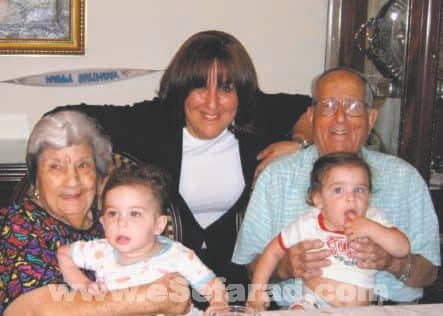‘It’s like being served in Yiddish, which is mameloshon for Ashkenazim, so these are our mamaloshens: Spanish, Arabic and French.

Brian Moskowitz Special to The CJN
Despite his hectic schedule, Yehuda Azoulay drove straight into late Friday afternoon Toronto traffic.
After hearing about a new charitable organization catering to the needs of the city’s Sephardi community, the 25-yearold father of two knew he’d found an opportunity to acknowledge those who helped establish the community and are keeping one of Judaism’s most important commandments: visiting the sick and elderly.
With wide smiles and an exchange of kisses on both cheeks, Azoulay, one of the volunteers of all ages who reach out to community members on a regular basis, greeted his octogenarian hosts, who have asked not to have their names used.
Originally from Marrakesh, the couple lives far from the rest of the community and have limited mobility, he said.
“I felt like they were my grandparents,” said Azoulay, who works in his family’s printing business while pursuing a master of education along with rabbinic ordination.
Many elderly Sephardim who began arriving in Canada in the 1930s speak Spanish, French and Arabic, which can be challenging both practically and emotionally, explained Denise Benzaquen Levin, who founded Rav Hesed – Sephardic Bikur Cholim in honour of her parents, Aaron and Vida Benzaquen, who arrived in Canada by boat from Morocco in 1958.
“There are people like my parents, who speak Spanish but have difficulty hearing. Trying to book Wheel-Trans with a host of [telephone] menus to navigate or even calling to order a newspaper can be very challenging and frustrating,” she said. Even when the phone volume is raised, menus are not repeated and the language barrier gets in the way, or they simply forget about their appointment, she added.
“It’s like being served in Yiddish, which is mamaloshen for Ashkenazim, so these are our mamaloshens: Spanish, Arabic and French.”
Al though many Sephardim speak different dialects of Ladino, Benzaquen Levin said that in the few months Rav Hesed has been operating, no one has requested help in Ladino.
Sephardim make up roughly 10 per cent of Toronto’s Jewish community, and Azoulay pointed out that some of the community’s elderly members aren’t being seen.
“It’s not a Sephardi or Ashkenazi thing – it’s a Jewish thing,” said Azoulay.
“When I first heard about this charity, I didn’t understand why it was necessary to have another one,” he said, referring to Toronto’s Bikur Cholim established shortly after World War II.
“Then I understood: the language barrier, the mentality, the connection to rabbis and other important Sephardi figures,” along with other facets of Sephardi cultures such as body language, religious literature and music, he said.
“Right now we’re going through the first generation of older people that still require the language and culture, so it’s important that we have people who can relate to the older generation,” said Rabbi Amram Assayag, chief Sephardi rabbi of Toronto.
Rabbi Assayag mentioned the benefit young people can gain through learning from the elderly, as well as the importance of performing acts of chesed or lovingkindness.
Rav Hesed’s volunteers provide comfort to families in their time of need, said Brindy Ehrentreu, intake co-ordinator at Toronto Bikur Cholim.
Ehrentreu said the organization refers Sephardi clients to Rav Hesed for this very reason.
“It’s that little bit extra that gives them reassurance and a certain security,” she said.
“Whatever Denise needs, we’re here to help her, whether the support is moral, material or otherwise.”
Benzaquen Levin explained that the assistance Rav Hesed provides can play a fundamental role in the emotional wellbeing of both clients and their families.
“The hardest mitzvah in the Torah is honouring one’s parents because when someone gets older they can become anxious, and sometimes they can’t manage their emotions. They see that they’re aging, and it’s a really hard stage which often frightens them. You’re only human and you get anxious too.”
Benzaquen Levin hopes to have the charity registered soon and currently funds it herself, but no organization exists without the help and generosity of its volunteers, she said.
“When food is delivered, Rav Hesed’s wonderful volunteers consider it to be part of their mitzvah, and do not ask for reimbursement. If it ever became an issue, we would certainly cover the expenses.”
For information on Rav Hesed’s services or to volunteer, contact 416-880-7417 or ravhesed@gmail.com.
Source: CJN 28/7/2011
 eSefarad Noticias del Mundo Sefaradi
eSefarad Noticias del Mundo Sefaradi

